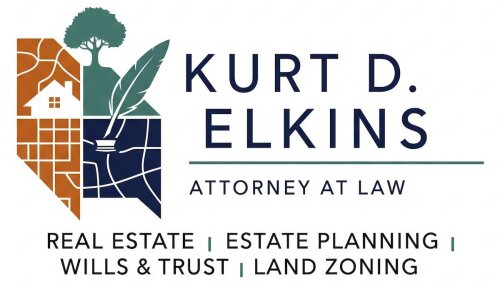Best Land Use & Zoning Lawyers in Texas
Share your needs with us, get contacted by law firms.
Free. Takes 2 min.
Free Guide to Hiring a Real Estate Lawyer
Or refine your search by selecting a city:
List of the best lawyers in Texas, United States
About Land Use & Zoning Law in Texas, United States
Land Use and Zoning law in Texas defines how land within the state can be utilized and developed. It involves a combination of local, county, and sometimes state regulations that govern building heights, density, lot sizes, the types of activities allowed on specific parcels, and more. Municipalities and counties in Texas often have zoning ordinances designed to manage growth, preserve property values, and enhance community character. Unlike some other states, Texas gives significant autonomy to local governments in adopting zoning rules, meaning that regulations can vary greatly from one city or county to another.
Why You May Need a Lawyer
There are various situations where individuals, businesses, or organizations could benefit from legal advice regarding Land Use and Zoning in Texas. Common scenarios include:
- Attempting to rezone property or obtain special permits for non-conforming uses
- Challenging or defending a zoning decision by a local government
- Facing enforcement actions due to alleged zoning or code violations
- Seeking variances or exceptions to existing land use restrictions
- Resolving disputes with neighbors or developers over land use impacts
- Navigating state or federally protected land concerns, such as environmental reviews
- Completing due diligence during real estate transactions to identify land use risks or restrictions
An experienced attorney can help interpret complex local ordinances, advise on application processes, represent clients before planning commissions or boards, and protect property rights.
Local Laws Overview
Texas Land Use and Zoning laws are primarily administered at the municipal and county levels. Here are several key aspects of local laws relevant to Land Use and Zoning in Texas:
- Zoning Districts: Local governments often classify land into districts such as residential, commercial, industrial, or agricultural. Each district comes with its own set of regulations regarding permitted uses and structures.
- Comprehensive Plans: Many cities and counties adopt comprehensive plans to guide growth and development, which inform updates to zoning ordinances and land use maps.
- Permits: Building permits, use permits, and special exceptions may be needed for construction or land development.
- Board of Adjustment: Most cities have Boards of Adjustment that hear requests for variances or appeals from zoning decisions.
- Notice and Public Hearings: Changes to zoning or requests for variances often require public notice and hearings where affected parties may express support or concerns.
- Home Rule vs. General Law Cities: Texas cities operate under varying levels of authority, with "home rule" cities having broader self-governing powers than "general law" cities, affecting their approach to zoning legislation.
- Grandfathered Uses: Existing uses that do not conform to new zoning ordinances may be "grandfathered," but expansion or changes to these uses can be restricted.
It is important to consult the specific ordinances of your city or county to understand your rights and obligations regarding land use.
Frequently Asked Questions
What is zoning and why does it matter in Texas?
Zoning is the division of land by local governments into zones for different uses, such as residential, commercial, or industrial. Zoning laws affect how you can use your property, what structures you can build, and what activities are permitted on your land.
Who enforces zoning laws in Texas?
Local city or county authorities, such as planning departments or code enforcement officers, are responsible for enforcing zoning regulations in Texas.
How can I find out the zoning classification of my property?
You can usually determine your property's zoning classification by contacting your local city planning or zoning office. Many municipalities also provide zoning maps and codes online.
Can I request a change to my property's zoning?
Yes, property owners may typically apply for rezoning through their local planning department. The process usually involves submitting a formal application, paying fees, and possibly attending public hearings.
What is a zoning variance?
A zoning variance is an exception that allows a property owner to use their land in a way that differs from current zoning requirements, usually due to special circumstances. Approval is generally granted by a Board of Adjustment.
What happens if I violate zoning laws?
Violating zoning rules can result in citations, fines, stop-work orders, or even legal action requiring you to remove structures or cease certain activities.
What is non-conforming use?
A non-conforming use is a land use that was legal when established but does not conform to current zoning regulations. These uses may continue under certain conditions, but expanding or changing the use can be prohibited.
Do zoning laws affect home-based businesses in Texas?
Many local zoning ordinances regulate or restrict home-based businesses, especially regarding signage, parking, or customer traffic. It’s important to check your local regulations.
Can neighbors oppose my land use applications?
Yes, neighbors and other interested parties can attend public hearings and object to zoning changes, variances, or special use permits that may affect their properties or the community.
Is agricultural land subject to zoning in Texas?
Yes, agricultural lands may be zoned to preserve rural character or restrict uses that could conflict with farming, but rules vary widely by county or city.
Additional Resources
If you need more information or assistance regarding Land Use and Zoning in Texas, consider these resources:
- Texas Municipal League - Provides information on local government powers and duties
- Texas Department of Housing and Community Affairs - Offers resources on land use planning
- Local City or County Planning and Zoning Departments - For specific ordinances and zoning maps
- Texas Real Estate Commission - For information on property transactions and related laws
- Universities or Law Schools in Texas - Often have public policy or legal clinics
Next Steps
If you believe you need legal assistance regarding Land Use and Zoning in Texas, start by gathering all relevant documents, such as deeds, surveys, notices, or correspondence with local authorities. Research your local zoning ordinances, as rules vary widely across Texas. Consult with a licensed attorney experienced in Texas land use and zoning law to discuss your situation, possible options, and the likely outcomes. Legal experts can help you prepare applications, attend hearings, or represent you in disputes, ensuring your interests and rights are effectively protected.
Acting promptly can help avoid costly mistakes or legal challenges. Consider reaching out to your local planning department or a qualified legal professional at the earliest sign of a land use issue or if you are planning any substantial change to your property.
Lawzana helps you find the best lawyers and law firms in Texas through a curated and pre-screened list of qualified legal professionals. Our platform offers rankings and detailed profiles of attorneys and law firms, allowing you to compare based on practice areas, including Land Use & Zoning, experience, and client feedback.
Each profile includes a description of the firm's areas of practice, client reviews, team members and partners, year of establishment, spoken languages, office locations, contact information, social media presence, and any published articles or resources. Most firms on our platform speak English and are experienced in both local and international legal matters.
Get a quote from top-rated law firms in Texas, United States — quickly, securely, and without unnecessary hassle.
Disclaimer:
The information provided on this page is for general informational purposes only and does not constitute legal advice. While we strive to ensure the accuracy and relevance of the content, legal information may change over time, and interpretations of the law can vary. You should always consult with a qualified legal professional for advice specific to your situation.
We disclaim all liability for actions taken or not taken based on the content of this page. If you believe any information is incorrect or outdated, please contact us, and we will review and update it where appropriate.
Browse land use & zoning law firms by city in Texas
Refine your search by selecting a city.














